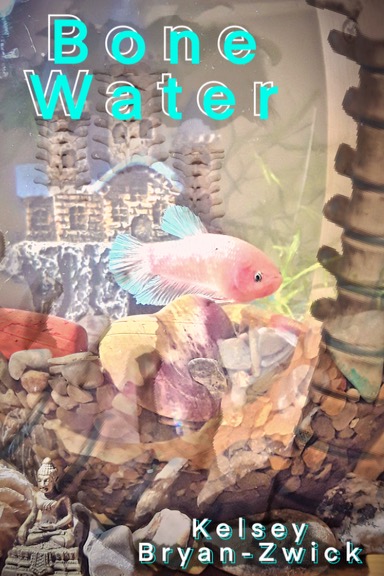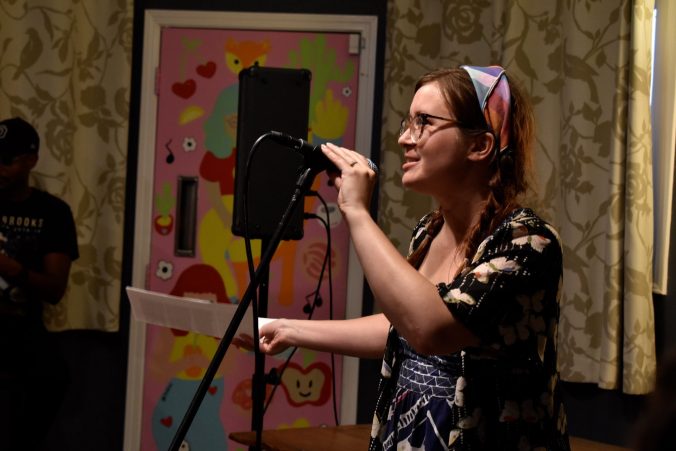Kelsey Bryan-Zwick’s Bone Water was released on September 22, 2021 from Blanket Sea Press. It was selected as part of our inaugural Awareness & Advocacy microchapbook series. We asked Kelsey to tell us more about the book, their writing workshops, and their disability advocacy.
What inspired you to write Bone Water?
I am often met with shock over my everyday experiences. And when I look around to see why, I believe there is a vast difference in how those of us with disabilities and long-term illness are treated when compared to those who are able-bodied. Then when I consider that 1 in 5 Americans will be disabled at some point in their lives, I realize that this sense of shock was something I, as a writer, could help to ease. To bridge the gap between our experiences a few words at a time. I wanted to show both the harshness of this reality but also the humanity, the love of body and all its realness.
How long have you been a poet, and what drew you to writing poetry?
Well, I was almost born in a library, so I kind of believe it was the smell of books that drew me out into this world. My family also immigrated back-and-forth from California to Spain, so before the age of five I was bilingual, and this gave me a deep respect for language and the ability to communicate. But I think what really hooked me onto poetry was the sound of my Grandma Zwick’s voice; she had memorized over 30 children’s rhymes and would recite them to me and my siblings as we drifted to sleep. I started writing poems independently at age nine, mostly in the lyric style.
You utilize a variety of formatting techniques throughout this book. They give each poem a unique feel and appearance. Do you have a process for deciding how a particular poem will be formatted? Do you think formatting can contribute to the impact or meaning of the poem?
I consider format to be almost like a character itself, or how a character is dressed in a particular scene. I tend to try out new forms in poetry workshops, or when I am trying out a prompt, which can turn into successful poems. But I also feel like I gather tools and tricks from this kind of practice that are then available to me when I am attempting to write and draft my own poem ideas. I love learning new forms because, for me, they can often help express a poem that I have attempted to write but failed to capture in the past. It’s like the idea-poem is just waiting for the right pair of shoes to step into, to become clear and walk into itself. Maybe also because scoliosis is considered a deformity, an illness of shape, and so this question of how things are formed is always at the forefront of my understanding.
You’re a Lead Collaborating Fellow at The Poetry Lab, a community learning space. Have your experiences as a workshop instructor informed your writing? If so, how?
Yes. For me, facilitating workshops is a wonderful way to appreciate all that I have gotten to learn about craft. I tend to pick topics that I have been researching in my own quest for learning and then presenting this knowledge and the questions I still have about a topic to a group. I learn so much from all the various interpretations and insights offered during these class discussions. Also, learning the organizational structure behind The Poetry Lab has taught me new ways to connect my poetry and writing to the world, as well as new ways to engage with readers and writers in my community.
Blanket Sea is donating 10% of the press’s first share of proceeds from your book to an advocacy organization. You chose The Breonna Taylor Memorial Scholarship to be that organization. Can you talk a little about the scholarship and why you started it?
I think a lot about bodies. How different categories of bodies are treated and interpreted by people and systems. I think about the violence and trauma that my body has had to endure in order to survive and it breaks my heart to know that violence is being perpetrated against fellow humans simply for being born black. I dream of an equitable society where we are all empowered to seek our full potentials, as ourselves.
When Breonna Taylor was killed, my heart, like so many broke, for her and those that loved her. Knowing what caregivers were going through already at the onset of this pandemic and being unable to protest in other ways, I decided to found a memorial scholarship in Breonna’s name, in support of other black women like her, dreaming of becoming a nurses. I put a call out to my local community and I reached out to Golden West College, which has an excellent nursing program. In May 2021, we were able to award two $500 scholarships to black women studying to be nurses, and now anyone can donate directly to this memorial.
I know many in the disabled community will understand the importance of good nurses and caregivers. As we wait for or dream of our next procedures, plan and reschedule doctors appointments, heal from or reject our latest treatments, it is nurses and caregivers that often are the reason we survive the day, the week, the year. But this memorial is also an acknowledgement that this relationship can be impacted by our personal biases, and this as much as anything, can cost us our lives. I dream of better; I dream of equity.
Why is disability advocacy meaningful to you?
I used to feel like I had to hide all the time. That if I didn’t talk about my scoliosis that it wouldn’t take over my life. I felt like I was disappearing though, that nobody knew who I was. My depression worsened, and I had a hard time socializing or even taking basic care of myself. My life always felt like “bad news,” and “gross,” and “impolite.” I finally realized it was killing me in a way, to never be myself, to have no relationships formed based on my need and my boundaries. And scoliosis is a developmental disorder, so my community of particular spoonies is mostly kids and teenagers, and I hated how alone I had felt those years especially. I want to shift the narrative, so that this experience can be different to those just getting their diagnosis.
Plus, well, the healthcare system here in the US is a tragedy. I advocate to survive.
What do you wish that people understood better when it comes to chronic pain, illness, and disability? Where could there be improvements in awareness, medical treatment, etc.?
I wish there was a more general understanding that my experience is a human one. That I continue to feel no matter how much I’ve felt. That I continue to bleed, no matter how much I have bled. Like many of us with disabilities, I work hard to keep this body going. That this is a respectful and responsible way to live my life, and that there is no shame in being disabled. It is not a choice, it is my fate, but I’ve agreed to the bargain as I believe there is still more beauty to be had.
Our whole disability system here in the US (the wealthiest nation on the planet) needs an overhaul. Many disability benefits haven’t been updated since the 90s. For me, this was a nine-year process that took two lawyers to help navigate. These benefits change depending on what state a person lives in. Here in California, because I am an adult with a childhood disability, I would have to give up the small protection I have been granted if I ever wanted to get married (to a non-disabled person, that is…). It is policies like these that codify bigotry in deeming people with disabilities “less than” or “nothing but a burden.” Though really, we are not the ones that have made this such an expensive healthcare system that continues to deliver sub-par care.
As far as treatment for those with chronic pain, I think destigmatizing and legalizing cannabis is so key for pain patients. There are so many benefits to be had for those suffering. It is not the only resource, nor will it be a solution for everyone, but it is one we need to mainstream, especially for long-term sufferers like myself.
Who are some of your favorite poets and authors?
Patricia Smith for the fire, Jane Hirshfield for poems on being, Langston Hughes for perspective, Mary Oliver for nature and dogs, Shira Erlichman for Odes to Lithium, Lynne Thompson for language, Tamara Hattis for her palate, Diane Di Prima for her letters, Lawrence Ferlinghetti for the Beats, Joy Harjo for her horses, bridgette bianca for the nowness, Brendan Constantine for depth and sparkle, Natalie Diaz for her honey and the Colorado river… I just finished my version of #thesealeychallenge so I caught up with a few books that had been waiting patiently on the night stand.
Tell us more about who you are. Hobbies, interests, fun facts? What would you like readers to know about you?
I can probably identify about 50 kinds of birds, 50 kinds of plants, 50 kinds of insects, and 50 kinds of marine life that are common here in Southern California. My gardening policy is let it grow at least until I can name it. I really love nature words and words that are fun to say. I love being out in the wilderness, and even though my hikes have gotten shorter and shorter, I love being on the trail and near the ocean. My desk-mate, Ruth Betta Ginsberg, is very pleased to have made the cover. I am obsessed with bubbly water and bubbles. My hair has been red, black, purple, brown, blonde, blue, aqua, and oh yeah, and a few greys. I prefer pie to cake, crunchy to smooth, and the Mexican Coke in a glass bottle to Pepsi. Though bubbly water above all of these. The most recent thing I submitted was a horror-noir short story, so you just never know.
What are you hoping that readers will take away from your work?
That we can survive the pain of our times. That we can ask for what we need. That we can live broken if we need to. That there is beauty outside of a cure. That mangled is a shape. That I am so thankful to have readers. That together there is a world to change.

Find out more about Bone Water and download your copy here. You can set your own price or get it for free. A portion of proceeds goes to The Breonna Taylor Memorial Scholarship.

Leave a Reply